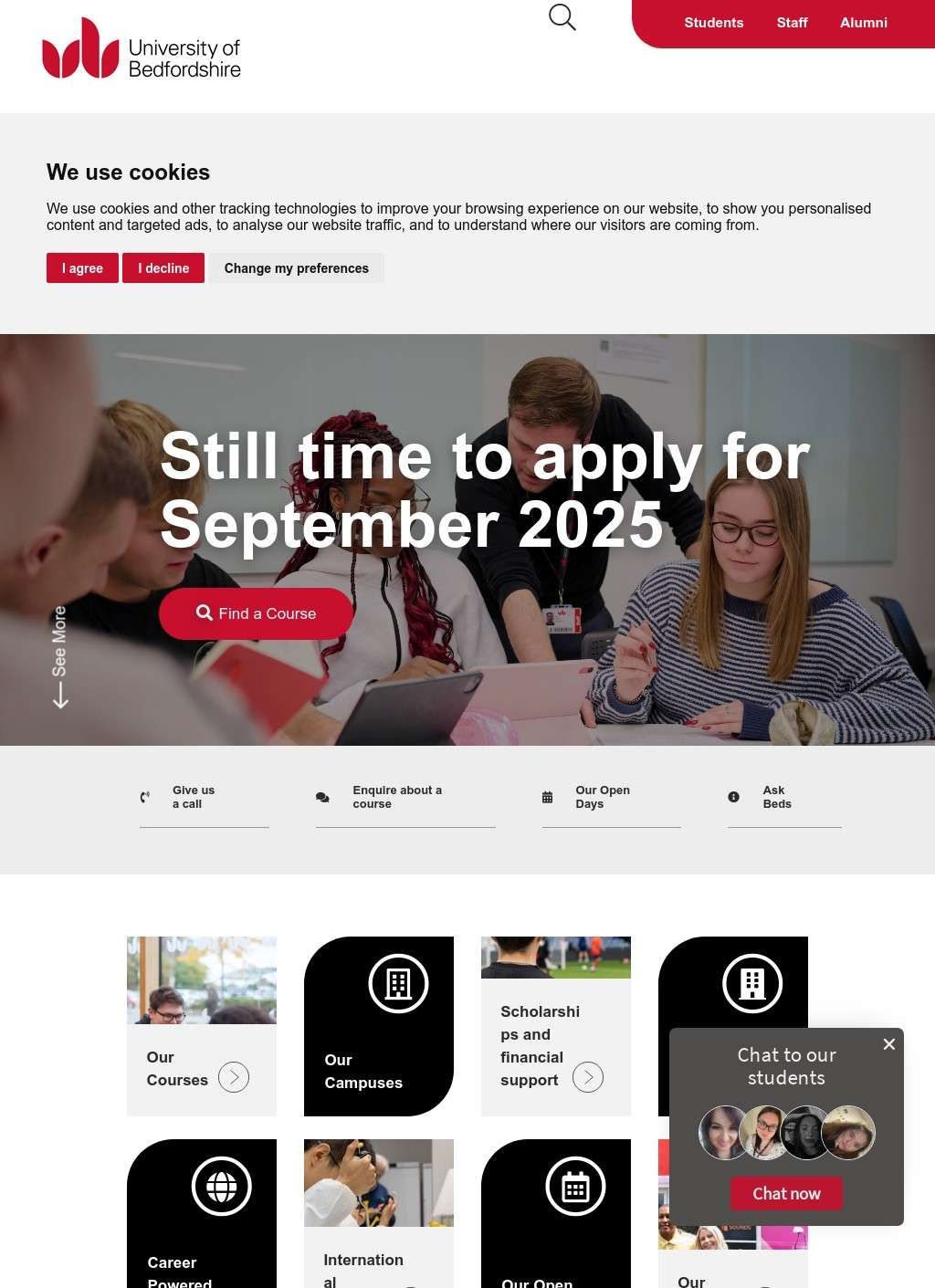University of Bedfordshire operates as a dynamic public research institution with educational heritage extending back to 1882, having evolved through multiple mergers and transformations to become a comprehensive university serving over 20,000 students from more than 100 countries. The institution gained university status in 1993 as the University of Luton before adopting its current name in 2006 following the merger with De Montfort University's Bedford campus. This evolution has created a multi-campus university with distinctive strengths in applied research, professional education, and international partnerships that bridge academic excellence with practical career preparation.
Campus infrastructure spans five primary locations designed to provide specialized learning environments tailored to different academic disciplines and student needs. The Luton campus occupies a prominent town center location featuring purpose-built facilities including a seven-story library opened in 2016, a £40 million STEM building supporting science and technology programs, the Media Arts Centre, healthcare simulation suites, and specialized facilities for business, law, and creative disciplines. The campus design emphasizes modern learning spaces that integrate technology with collaborative learning environments, reflecting contemporary pedagogical approaches and industry standards.
Bedford campus maintains the university's historical connections to teacher education, having originated as Bedford Training College for Teachers in 1882 and Bedford Physical Training College in 1903. Contemporary developments have expanded the campus significantly beyond education, incorporating facilities for health sciences, psychology, social work, and sport sciences. The campus setting combines heritage buildings with modern facilities, creating a distinctive learning environment that respects historical significance while providing contemporary educational resources and student support services.
Milton Keynes campus represents the university's newest addition, officially launched in 2013 through partnerships with Milton Keynes Council and local business communities. The campus delivers foundation, undergraduate, and postgraduate programs while emphasizing connections with local employers and professional development opportunities. Located in Saxon Court on Avebury Boulevard, the facility provides modern learning spaces, digital resources, and business partnership opportunities that reflect the university's commitment to career-focused education and regional economic development.
Academic organization encompasses four faculties covering Creative Arts, Technologies and Science; Education and Sport; Health and Social Sciences; and the University of Bedfordshire Business School. This structure supports interdisciplinary collaboration while maintaining specialized expertise in distinct academic areas. The university's teaching approach emphasizes practical application, professional accreditation, industry placements, and hands-on experience designed to enhance graduate employability. Recent graduate employment statistics indicate 92% of graduates secure employment or further study within six months of graduation.
Research activities span multiple disciplines with particular strengths in applied research addressing real-world challenges and professional practice improvements. The university entered the Research Excellence Framework in 2014, achieving significant improvements in research quality rankings. Research centers and institutes collaborate extensively with external partners including healthcare organizations, technology companies, creative industries, and public sector agencies. These partnerships provide students with research opportunities while contributing to knowledge advancement in areas directly relevant to professional practice and societal needs.
International partnerships extend across continents, with collaborative programs delivered in partnership with institutions in China, Vietnam, Middle East, Europe, and Southeast Asia. These partnerships enable students to access international educational experiences while supporting the university's global reach and cultural diversity objectives. The international student population contributes significantly to campus diversity, creating multicultural learning environments that prepare graduates for global career opportunities and cross-cultural professional competencies.
Student support services encompass comprehensive academic support, careers guidance, mental health and wellbeing services, spiritual care, and practical assistance including accommodation, financial guidance, and disability support. The university recognizes that over 40% of students represent first-generation university participants, with 70% being mature learners and over half from ethnic minority backgrounds. Support services are specifically designed to address these demographic characteristics, ensuring all students receive appropriate guidance and assistance throughout their academic journey.
Industry connections permeate academic programs through advisory boards, guest lectures, placement opportunities, and collaborative projects that ensure curriculum relevance and graduate employability. The university maintains partnerships with major employers across sectors including healthcare, technology, creative industries, business, and public services. These relationships provide students with work experience opportunities, mentorship programs, and direct pathways to graduate employment while ensuring academic programs remain current with industry developments and professional requirements.
Digital innovation initiatives include online learning platforms, virtual reality training systems, digital media production facilities, and technology-enhanced learning environments that prepare students for modern workplace requirements. The university invests significantly in educational technology, including specialized software, industry-standard equipment, and digital learning resources that mirror professional environments. These investments ensure graduates possess technological competencies expected by contemporary employers while supporting flexible learning approaches that accommodate diverse student circumstances.
Community engagement activities connect university expertise with local communities through cultural programs, public lectures, community research projects, and voluntary initiatives. The Culture and Community Engagement team facilitates partnerships between university specialists and civic organizations, creating mutual benefits for academic development and community well-being. These activities demonstrate the university's commitment to social responsibility while providing students with opportunities to apply academic learning in community contexts.
Alumni networks span global locations and diverse professional sectors, providing ongoing connections for graduates while supporting current students through mentorship, placement opportunities, and career guidance. Notable alumni include politicians, business leaders, healthcare professionals, educators, and creative industry professionals who contribute to the university's reputation while demonstrating the career success achieved by graduates. Alumni engagement activities include networking events, professional development programs, and philanthropic initiatives that strengthen institutional connections and support future student opportunities.
